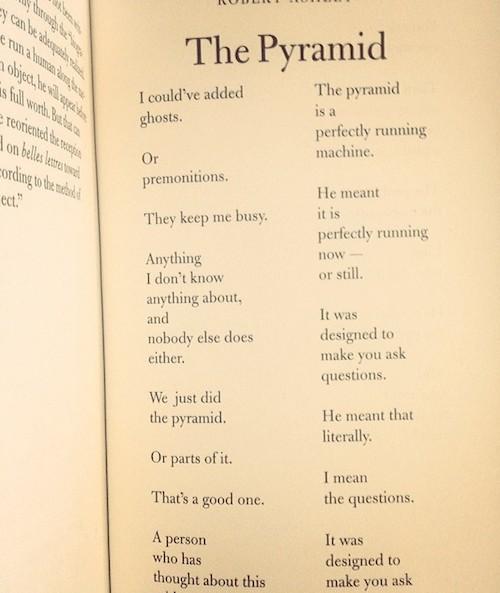Imperfect News, but Art in All Directions: Robert Ashley, 1930–2014
Robert Ashley--composer, performer, librettist, poet, artist, and pioneer in the development of large-scale, collaborative performance works and experimental opera--died yesterday afternoon. From The Guardian:
Kyle Gann, who recently wrote a biography on the composer, wrote on his website that he had received confirmation of the composer’s death. Ashley had been diagnosed with cirrhosis of the liver last June. He died on 3 March at approximately 1:30pm.
“Bob was one of the most amazing composers of the 20th century, and the greatest genius of 20th-century opera,” Gann writes. “I don’t know how long it’s going to take the world to recognize that.”
As well as being known for his radical reinvention of the operatic form, fusing electronic music into his operas and theatre works, Ashley also co-founded the Cooperative Studio for Electronic Music in 1958 alongside Gordon Mumma, before creating the performing arts event ONCE Festival in the 60s. He won the John Cage Award for Music from the Foundation for Contemporary Performance Arts in 2002.
UbuWeb reports on Twitter: "If not for Robert Ashley, there would've never been an UbuWeb. #backstory." And if not for Robert Ashley, there would be no Perfect Lives, the inimitable television opera that you can view in full here. You can also find Perfect Lives in print from Dalkey Archive.
Perfect Lives has been called "the most influential music/theater/literary work of the 1980s." At its center is the hypnotic voice of Robert Ashley. His continuous song narrates the events of the story and describes a 1980's update of the mythology of small town America. Perfect Lives is populated with myriad characters revolving around two musicians — "R", the singer of myth and legend, and his friend, Buddy, "The World's Greatest Piano Player". They have come to a small town in the Midwest to entertain at the Perfect Lives Lounge. As Robert Ashley describes in the opera synopsis, "they fall in with two locals to commit the perfect crime, a metaphor for something philosophical: in this case, to remove a sizable about of money from The Bank for one day (and one day only) and let the whole world know that it was missing."
The eloping couple, Ed and Gwyn, the old people at the home, the sheriff and his wife (Will and Ida) who finally unravel the mystery, and Isolde who watches the celebration of the changing of the light at sundown from the doorway of her mother's house are some of the characters who journey through the seven episodes of the opera.
Derived from a colloquial idiom, Perfect Lives transforms familiar material into an elaborate metaphor for the rebirth of the human soul. It has been called a comic opera about reincarnation.
We'd also highly recommend UbuWeb's Robert Ashley Sound page, where you'll find recordings of performances and compositions from the late sixties to 2007. A typically generous turn is "Some Common Observances" (1972), which comments on the cult book-length poem by John Barton Wolgamot, "In Sara, Mencken, Christ, and Beethoven There Were Men and Women."
Some Common Observances by Robert Ashley (1972)
1. On examining the structure of Wolgamot's poem, I have seen that it is possible to pronounce every stanza, without taking a fresh breath. Among other things, given the fact that it was not possible to do otherwise, I successively became convinced that this was the poet's intention. Wolgamot, who I only met later, observed ironically in this regard: "I bet you had difficulty with the last page."
2. Another problem which I had to solve was the pronunciation of the proper nouns. As I could not pronounce them each time in their original language and, on the other hand, to avoid the usual sing-song way radio announcers have of speaking, I took the unusal decision to read them as though they were in English. In this way, among other things, I believe I underlined the American tone of the poem better, its relations with the 1950's American culture and the embarrassment of the latter in comparison with European culture.
3. Having linked together the recordins of the individual stanzas, I began to experiment with various accompaniments to the point of imagining a structure of the poem capable of including the entire ambience in which it was immersed, like light, temperature, etc. In fact, this insight is my only real contribution to the poem given the fact that, in no way, did I want to modify it's already perfect form. I have therefore elaborated two different types of accompaniment, one which is a simple surrounding to the vocal structure (used for the first performance in Bremen, 1972), and another where the same structural characteristics of the poem guide the accompaniment, as they do in this recording.
4. Paul DeMarinis, an expert in Moog Synthesizers, has elaborated seven different modular combinations, each of which can be controlled by programmed impulses. These derive from the sound of the reading of the poem passed through a regeneration high frequency filter and successively translated into a series of command impulses.
Just the other day, we were reading some more recent texts by Robert Ashley in the newest issue (11) of F.R. David, a journal published by de Appel, Amsterdam, "concerned with the position of reading and writing in the arts," and edited by artist/performer/designer Will Holder. Ashley's "The Observer Text," from the 2007 opera Concrete, is interspersed throughout the issue. Here's our poor photograph of one page ("The Pyramid").

When he died, Robert Ashley was in the midst of working on CRASH--a new opera for six voices with an intimate account of his life--to be directed by Alex Waterman and performed, along with two other operas over three consecutive weeks (featuring 30 artists), for the Whitney Biennial. A benefit for the operas will be held at Issue Project Room in New York on March 24.
Our thoughts are with his friends, collaborators, and family.


